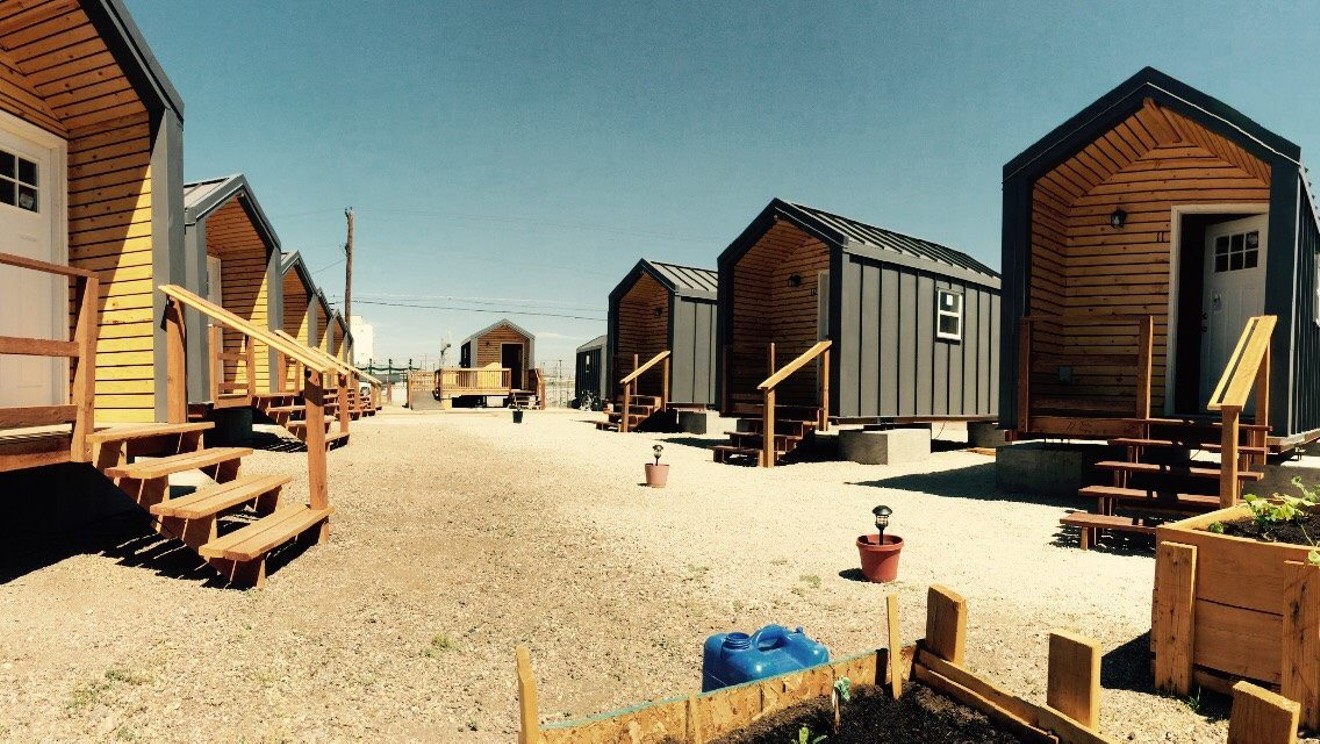At the latest meeting on Friday, February 15, some Globeville residents said they wouldn't even consider a “good neighbor” agreement spelling out rules and expectations for the tiny home village if it were to move in at 4400 North Pearl Street. They said they are against the village coming to the neighborhood under any circumstances.
The fierce opposition has taken both city officials and supporters of the tiny home village by surprise. Now, a Denver City Council vote on the relocation has been postponed, and the future location of the tiny home village is once again up in the air.
While there are certainly a handful of very outspoken individuals at these meetings — one woman called the homeless “roaches” at the last meeting, and much of the conversation has degraded into baseless and accusatory discussions of criminal backgrounds and sex-offender checks for formerly homeless residents of the tiny home village — what's unclear, even to the city councilman who represents Globeville, Albus Brooks, is just how reflective the loudest voices are of the will of the community.
Brooks says he hopes to get to the bottom of which residents would entertain a good neighbor agreement and which are adamantly opposed to a tiny home village at a meeting that has just been announced for this Saturday, February 23, at 11 a.m. at Laradon Hall, 5100 Lincoln Street.
"I get the frustration," he says, "because one layer to this is, there hasn't been the appropriate amount of time to educate the community about what's going on. So a lot of folks just don't understand. There's another layer of, 'Hey, we're Globeville, and the city doesn't care about us because of the history.'"
By history, Brooks is obliquely referring to ways in which Globeville feels it's been railroaded in the past, from taking on industrial pollution to being swept aside by more powerful entities for projects like the I-70 and National Western Center expansions.

The proposed tiny home village site is located between Washington Street, Pearl Street and 44th Avenue in Globeville.
Google Maps
Brooks laments that Globeville residents weren't included in the process earlier, but says he's found it difficult to discern just how many residents are truly against the tiny homes under any circumstances.
"At the community meetings, it's really hard to tell when you have other people yelling and screaming and judging peoples' character," he says. “It's a tough environment for those who are positive toward the village to say so."
David Henninger, executive director of Bayaud Enterprises, a major homeless-service provider in the city, was at the gathering last Friday and recalls two individuals telling him after the meeting that they wanted a more civil conversation about the tiny home village but were afraid to speak up in front of louder neighbors who vehemently oppose it.
“They told me, 'What you heard tonight isn't representative of who we are. We believe in civil discourse and we believe in dialogue,'" Henninger says. “But it was the wrong environment to state what they believe. And I can appreciate how, in a neighborhood that is that close-knit, with many fourth- or fifth-generation residents, there's going to be family feuds and complicated dynamics that have been there for decades, so you have to be very careful what you say.
"I get the anger,” Henninger continues, “but some of the language...just about put me over the edge. It's like pitting the poorest against the poor. And it's unfortunate.”
Cole Chandler of the Colorado Village Collaborative, which is behind the Beloved Community Village, says he believes the supporters are being drowned out by the naysayers. He shared with us a message sent to him from a local resident who hasn't been able to attend the meetings:
“I am a HUGE supporter of what you all are doing with the tiny village. I'm so deeply saddened that many of my neighbors reacted with fear and hostility at the notion of the Beloved Community moving to our neighborhood. I have loved the work you all are doing since you started and I would LOVE to have the village as my neighbor.”Brooks says that he and the Department of Community Planning and Development are working with the Urban Land Conservancy, the owners of the land that the Beloved Community village currently sits on at 38th and Blake streets, to establish a new timetable for moving, since it is apparent that the village won't be relocated by the original March 1 deadline.
"What I'm guaranteeing is that we will find a home; no one is going to be displaced,” Brooks says. “We're making sure that these folks who have been situated [at the tiny home village] will have a place to stay. But we have no defined timelines right now until we continue talking to the ULC."
And he's not giving up on Globeville, either. He just thinks it's going to take a lot more conversations and figuring out how to appease concerns.
"I've long been supportive of the tiny homes, but I'm not going to put villagers and community people at odds with each other," he says. "We need to do the proper communication and education. I want to see the community and tiny homes get to a 'yes,' and that's what my job is: negotiating community interests that will work for all parties."












